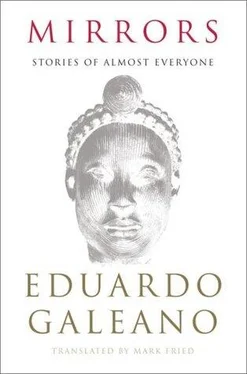Not long before, Rosa Luxemburg wrote an article on the first years of the Russian Revolution. The article, penned in her German jail cell, opposed the divorce of socialism and democracy.
• On the new democracy:
Socialist democracy is not something which begins only in the promised land after the foundations of the socialist economy are laid. It does not come as some sort of Christmas present for the worthy people who, in the interim, have loyally supported a handful of socialist dictators. Socialist democracy begins simultaneously with the beginnings of the destruction of class rule and of the construction of socialism.
• On the people’s energy:
The remedy which Trotsky and Lenin have found, the elimination of democracy as such, is worse than the disease it is supposed to cure; for it stops up the very living source from which alone can come correction of all the innate shortcomings of social institutions. That source is the active, untrammeled, energetic political life of the broadest masses of the people.
• On public control:
Public control is indispensably necessary. Otherwise the exchange of experiences remains only within the closed circle of the officials of the new regime. Corruption becomes inevitable.
• On freedom:
Freedom for the supporters of the government, only for the members of one party — however numerous they may be — is no freedom at all. Freedom is always and exclusively freedom for the one who thinks differently.
• On the dictatorship of bureaucracy:
Without general elections, without unrestricted freedom of the press and of assembly, without a free struggle among opinions, life withers in every public institution, becomes a mere semblance of life in which the bureaucracy remains the only active element. Public life gradually falls asleep, as a few party leaders of inexhaustible energy and boundless experience direct and rule. Among them, in reality only a dozen outstanding heads do the leading, and an elite of the working class is invited from time to time to meetings where they are to applaud the speeches of the leaders and to approve proposed resolutions unanimously.

They say Churchill said:
“Jordan was an idea I had one spring at about four-thirty in the afternoon.”
The fact is that during the month of March 1921, in just three days, British Colonial Secretary Winston Churchill and his forty advisers drew a new map for the Middle East. They invented two countries, named them, appointed their monarchs, and sketched their borders with a finger in the sand. Thus the land embraced by the Tigris and Euphrates rivers, the clay of the very first books, was called Iraq. And the new country amputated from Palestine was called Transjordan, later Jordan.
The task at hand was to change the names of colonies so they would at least appear to be Arab kingdoms. And to divide those colonies, to break them up: an urgent lesson drawn from imperial memory.
While France pulled Lebanon out of a hat, Churchill bestowed the crown of Iraq on the errant Prince Faisal, and a plebiscite ratified him with suspicious enthusiasm: he got 96 percent of the vote. His brother Prince Abdullah became king of Jordan. Both monarchs belonged to a family placed on the British payroll at the recommendation of Lawrence of Arabia.
The manufacturers of countries signed the birth certificates of Iraq and Jordan in Cairo’s Semiramis Hotel, and then went out to see the pyramids.
Churchill fell off his camel and hurt his hand.
Fortunately, it was nothing serious. Churchill’s favorite artist could continue painting landscapes.

In 1932, Ibn Saud completed his long war to conquer Mecca and Medina, and proclaimed himself king and sultan of those holy cities and of the vast surrounding desert.
In an act of humility, Ibn Saud named his kingdom Saudi Arabia after his own family. And in an act of amnesia, he gave the country’s petroleum to an American company, Standard Oil, forgetting that between 1917 and 1924 he and his family had eaten from the hand of the British, as the account books attest.
Saudi Arabia became a model of democracy in the Middle East. Its five thousand princes waited seventy-three years to hold the first elections. In that vote, for municipal offices only, no political parties took part since they were all outlawed. No women either, since they too were outlawed.

At nine years old, she works cleaning houses in St. Louis on the banks of the Mississippi.
At ten, she starts dancing for coins in the street.
At thirteen, she marries.
At fifteen, once again. Of the first husband she retains not even a bad memory. Of the second, his last name, because she likes how it sounds.
At seventeen, Josephine Baker dances the Charleston on Broadway.
At eighteen, she crosses the Atlantic and conquers Paris. The “Bronze Venus” performs in the nude, with no more clothing than a belt of bananas.
At twenty-one, her outlandish combination of clown and femme fatale makes her the most popular and highest-paid performer in Europe.
At twenty-four, she is the most photographed woman on the planet. Pablo Picasso, on his knees, paints her. To look like her, the pallid young damsels of Paris rub themselves with walnut cream, which darkens the skin.
At thirty, she has problems in some hotels because she travels with a chimpanzee, a snake, a goat, two parrots, several fish, three cats, seven dogs, a cheetah named Chiquita who wears a diamond-studded collar, and a little pig named Albert, whom she bathes in Je Reviens perfume by Worth.
At forty, she receives the Legion of Honor for service to the French Resistance during the Nazi occupation.
At forty-one and on her fourth husband, she adopts twelve children of many colors and many origins, whom she calls “my rainbow tribe.”
At forty-five, she returns to the United States. She insists that everyone, whites and blacks, sit together at her shows. If not, she will not perform.
At fifty-seven, she shares the stage with Martin Luther King and speaks against racial discrimination before an immense crowd at the March on Washington.
At sixty-eight, she recovers from a calamitous bankruptcy and at the Bobino Theater in Paris she celebrates a half century on the stage.
And she departs.

“I never stop acting,” she said. “Always and everywhere, in all sorts of places, at every instant. I am my own double.”
Nobody knew if Sarah Bernhardt was the best actress in the world or the biggest liar in history or both at once.
At the beginning of the twenties, after half a century of unchallenged reign, she remained the queen of theater in Paris and wherever else her endless tours took her. She was nearly eighty, so thin she cast no shadow, and minus a leg. All Paris knew it, but all Paris chose to believe that the irresistible girl, who drew sighs just by walking by, was doing a stupendous job of portraying a poor mutilated elderly woman.

When he was a barefoot boy kicking soccer balls made of rags down nameless streets, he rubbed his knees and ankles with grasshopper grease. That’s what he said, and that was how he got his leg magic.
Читать дальше

















